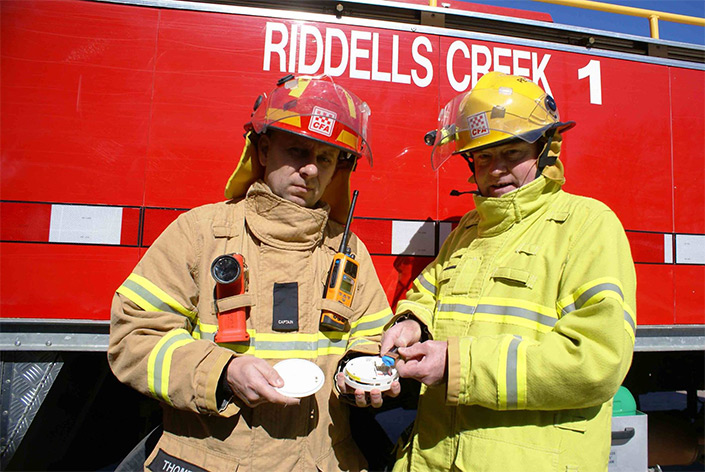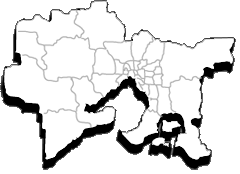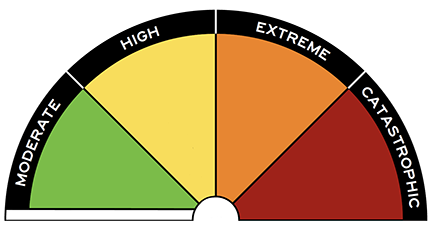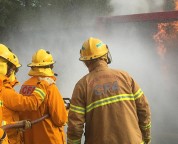
Daylight Saving Time begins at 2am (AEST) on Sunday the 4th of October. This is perfect time to change your smoke alarm batteries.
Mount Macedon and Districts Group 1st DGO (Deputy Group Officer) Marcus Bootle said “the CFA recommends that all Victorians should replace their smoke alarm batteries around the time that they change their clocks for the start of daylight saving – which is NOW.
“The message is quite simple: only working smoke alarms save lives. If there’s no sound from your smoke alarm, there’s no warning.
“All smoke alarms, whether hard-wired or wireless, require a battery” added Mr Bootle. “Hard-wired alarms use a battery as a back up and the battery needs to be changed as well.
“It is also essential that smoke alarms are tested on a regular basis”, added 3rd DGO and Riddells Creek Captain Dave Thompson.
“By law, every home must have at least one working smoke alarm – but the safest option is to install an alarm in every room where someone sleeps.
“Smoke alarms usually have a lifespan of about 10 years”, said Mr Thompson, “alarms older than this should be replaced. Some smoke alarms have a printed use-by date, but if an alarm is still ‘beeping’ after its battery has been changed, it should be replaced.
“When we are asleep, our sense of smell is significantly reduced, and we’re unlikely to smell the smoke. The smoke may even put occupants into a deeper sleep, so a smoke alarm actually helps wake you. And, with all of the plastics, materials, electronics and chemicals around – house smoke can be extremely toxic”.
The statistics are frightening.
In 2014 CFA responded to 1,652 residential fires, resulting in 16 deaths and an estimated $50 million damage. In the Macedon Ranges alone, there were 13 residential fires.
A recent Duracell Fire Safety Survey conducted in Victoria and Tasmania found that 38% of family homes had only one smoke alarm installed and 28% sometimes disconnect their smoke alarm or take out batteries to prevent false alarms.
“We can’t emphasise enough the importance of working smoke alarms and the importance of smoke alarms installed in correct locations,” Mr Bootle said. “Without working smoke alarms you are four times more likely to die in a house fire”.
The Survey also found that:
• Only 54% of households surveyed replace smoke alarm batteries every 12 months, as recommended by Australian fire services;
• Only 31% of households knew how to test the smoke alarm properly (by pressing the button until the siren sounds); and
• Only 39% of households changed smoke alarm batteries on a specific date each year.
Additional studies also discovered that:
• About 64% of house fires were unintentionally lit;
• Around 56% of these started in the kitchen during cooking and a further 15% the result of electrical faults;
• More than 70% admitted to accidentally leaving a cooking appliance on after preparing a family meal and not realising it until sometime later;
• More than half (54%) admitted to doing other things while cooking most days, with the majority (96%) multi-tasking at least once a week while cooking;
• In more than 95% of metropolitan household fires someone was home at some stage during the fire; and
• If you don’t have a working smoke alarm installed in your home, and a fire occurs, you are 57% more likely to suffer property loss and damage and 26% more likely to suffer serious injuries
Smoke alarms are compulsory in every home.
Since 1 August 1997, Victorian law states that smoke alarms (complying with Australian standards AS 3786) must be installed in all homes, units, flats and townhouses. It is the legal responsibility of all owners and landlords to install working smoke alarms.
Residential homes constructed before 1st August 1997 need only 9 volt battery powered smoke alarms installed. Residential homes constructed after 1st August 1997 must have smoke alarms connected to 240 volt mains power. In addition a backup battery must be installed in the smoke alarm.
All fire services in Australia recommend photo-electric smoke alarms when installing or replacing existing smoke alarms. Smoke alarms need to be maintained in accordance with the manufacturers specifications.
To ensure you have a working smoke alarm you should test it weekly by pushing the test button with a broom handle to make sure it beeps, dust the alarm with a vacuum cleaner brush and change the battery at least once a year.
Do your children know what to do when the smoke alarm goes off? Simple actions like getting down low and crawling under smoke save lives, and every family should have a home fire escape plan that identifies all possible escape routes.
Smoke alarms and subsidies for the hearing impaired
Special smoke alarms are available for the hearing impaired. These should feature a flashing strobe light and a vibrating pad that can be placed under the pillow to activate when the alarm sounds.
Hearing impaired smoke alarms can link with standard smoke alarms to alert all household members, regardless of hearing levels. When one alarm senses smoke, all will activate. Other models are portable units that can be taken from one residence to another.
Profoundly deaf people can apply for a smoke alarm subsidy to help cover the costs of visual and vibrating smoke alarms. For further details contact the Victorian Deaf Society.
“So please, at the start of daylight saving when you change back your clocks, change your smoke alarm batteries with long-life alkaline batteries,” concluded Mr Thompson.
Photograph by Mike Dornau: Mount Macedon and Districts Group 3rd DGO and Riddells Creek Captain Dave Thompson and 1st DGO Marcus Bootle.
For further information contact Mountain Group Media Officer Mike Dornau on 0409 093 935 or [email protected]
















